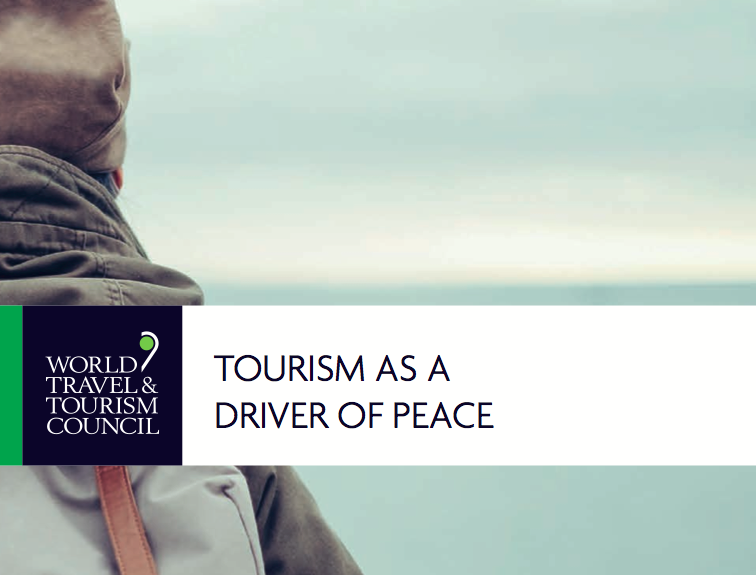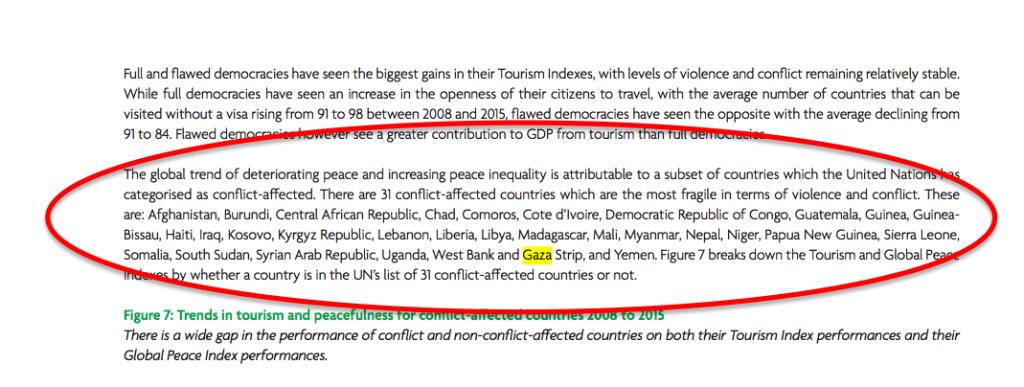
16 May, 2016
WTTC Report on Peace & Tourism Wipes Palestine Off the Map
A report issued by the World Travel & Tourism Council to stress the link between tourism and peace has effectively wiped the globally recognised state of Palestine off the map. The serious omission has proved why tourism will never be able to seriously contribute to global peace unless groupings like the WTTC and indeed, many of its individual members, begin to think straight about the wider implications of the world’s most protracted geopolitical conflict.
Claimed to be the first of its kind, the report was issued by the WTTC in partnership with the Institute of Economics and Peace (IEP). According to the WTTC, the research shows that countries with a more open and sustainable tourism sector tend to be more peaceful. The reverse is also true: The more sustainable a country’s tourism sector, the lower the country’s level of violence and conflict is likely to be. Says the report, “In non-conflict-affected countries, tourism is resilient to deteriorations in violence and conflict, even when terrorism is targeted at tourists.”

The highlight of the report is a Tourism Index which rates countries based on the level of peace, conflict and tourism. It explains: “This report develops a measure of tourism openness and sustainability (the Tourism Index) based on four domains: socio-cultural, economic, environmental, and political. It then investigates relationships between tourism sustainability and three measures of peacefulness: the absence of violence and conflict (negative peace), the institutions, structures and attitudes which create and sustain peaceful societies (positive peace), and the absence of terrorism.”
It adds, “Since 2008, the global trend has been improvements in tourism sustainability and openness, although there are significant regional differences. In 2015, the top ten countries in terms of tourism openness and sustainability were Spain, France, Germany, United States, Italy, the United Kingdom, Austria, Greece, Australia, and Mexico. The bottom ten performers over-represent the sub-Saharan African region: Angola, Rwanda, Togo, Bangladesh, Ethiopia, Benin, Mozambique, Tanzania, Burkina Faso and Nigeria.”
For those who just want to skim the surface, merely looking at the Index and the country rankings will be enough. But a little burrowing into the details will show up some shocking and inexcusable omissions.
The most critical omission lies herein: “The global trend of deteriorating peace and increasing peace inequality is attributable to a subset of countries which the United Nations has categorised as conflict-affected. There are 31 conflict-affected countries which are the most fragile in terms of violence and conflict. These are: Afghanistan, Burundi, Central African Republic, Chad, Comoros, Cote d’Ivoire, Democratic Republic of Congo, Guatemala, Guinea, Guinea-Bissau, Haiti, Iraq, Kosovo, Kyrgyz Republic, Lebanon, Liberia, Libya, Madagascar, Mali, Myanmar, Nepal, Niger, Papua New Guinea, Sierra Leone, Somalia, South Sudan, Syrian Arab Republic, Uganda, West Bank and Gaza Strip, and Yemen.”

Note the reference to a “country” named “West Bank and Gaza Strip.” For one thing, there is no such country as “West Bank and Gaza Strip.” It’s called Palestine, which is recognised by the United Nations as being illegally occupied by Israel. The state of Palestine itself is recognised by more than 100 global governments.
Yet, there is no mention of “Palestine” anywhere in the report.
Instead, Israel, whose illegal occupation of Palestine is globally recognised as a root cause of regional mayhem and violence, is mentioned in very complimentary terms. Says the report, “The MENA (Middle East and North Africa) region, driven by the poor performances of Iraq and Syria, suffers from generally low levels of tourism sustainability and high levels of violence and conflict, although it also shows the greatest variation in scores on both dimensions. Israel is a major positive outlier in the MENA region, with relatively open and sustainably tourism sector despite low levels of negative peace.”
Quite an interesting conclusion this: The low levels of tourism in MENA is attributed to the “poor performances of Iraq and Syria” while Israel is hailed as “a major positive outlier in the MENA region.” In fact, Israel scores 6.317 on the Tourism Index, even higher than tourism giants such as Thailand (5.968).
Another reference to Israel is even more noteworthy. It says, “Changes in relations with neighbours may also be affected by tourism. At an individual level, travelling to neighbouring countries may promote understanding and tolerance of the other. At the state level, travelling to neighbouring countries may promote mutually beneficial economic gain. For example, Israeli ecotourists visiting Jordan had positively altered their perceptions of Jordanian institutions and culture, when compared to a control group that did not travel.”
Researchers, senior executives and board members of both the WTTC and the Institute of Economics and Peace need to get a history lesson.
Yes, it is very true that “Changes in relations with neighbours may also be affected by tourism. At an individual level, travelling to neighbouring countries may promote understanding and tolerance of the other.”
To verify the accuracy of that statement, the WTTC-IEP should read this report: RAND Corp Report Puts Multi-Billion $ Value on Israel-Palestine Peace and Tourism
When they are done, they can read these:
History Lesson for ITB Berlin: 20 Years Since the Finest Travel & Tourism Speech Ever
Historic Pictures: Israeli PM Who Hailed Peace at Hotels Confab, & Shot 2 Days Later
Remembering The Day The World Really Changed
2015: The Year the Merchants of Death Hijacked the Industry of Peace
Israel continues to shatter Rabin’s dreams, and fulfill those of his terrorist killer
Rabin’s Death Anniversary: Jews and Travel & Tourism Need Some Soul-Searching
In the official media release, WTTC CEO David Scowsill is quoted thus: “In a world of increasing risk and security concerns, this research is compelling evidence of why governments should continue to focus on tourism development for the good of their people, and make policy decisions that balance the safety of their citizens with the continued facilitation of travel for business and leisure purposes.”
Steve Killelea, Founder & Executive Chairman, IEP, is quoted as saying: “The data shows how tourism and peace can support each other and increase societal resilience, prosperity, and peace in the long term. This also shows how the tourism sector is one of the key areas in which the private sector can play a positive and tangible role in contributing to global peace.”
All those motherhood-and-apple-pie statements are true — an independent state of Palestine would become an overnight tourism sensation, attracting probably more visitors than Cuba, Iran and Myanmar combined.
But their credibility begins to fray when references to the world’s thorniest geopolitical conflict are conveniently smudged. Indeed, it is thanks to the massive and sustained financial, political, economic and diplomatic support of Israel by many of the WTTC bigwigs that nourishes and nurtures the Israeli occupation of Palestine year after year.
If these same bigwigs would stop fulfilling the dreams of Israeli terrorist assassin Yigal Amir and pressure Israel to seek a genuine peace and facilitate the creation of an independent state, this statement (“Changes in relations with neighbours may also be affected by tourism. At an individual level, travelling to neighbouring countries may promote understanding and tolerance of the other”) may prove to be the most accurate of all.
Otherwise these reports only provide further proof of the hypocrisy and deceit that will see the occupation enter its 50th year in 2017.
Finally, did the WTTC-IEP think that nobody would notice the oversight?
Well, I did.
I, and I am sure the long-suffering people of Israeli-occupied Palestine, are looking forward to an explanation.
Download the WTTC report here: http://www.wttc.org/research/other-research/tourism-as-a-driver-of-peace/



Liked this article? Share it!